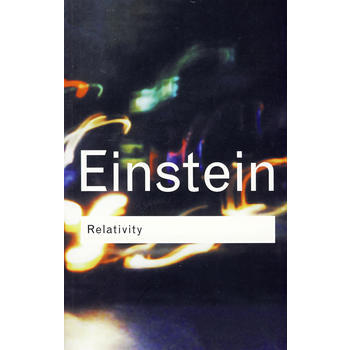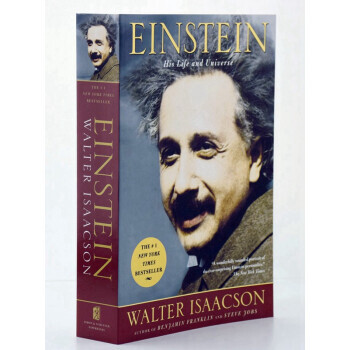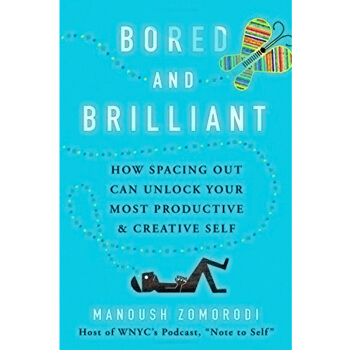

具体描述
内容简介
In this famous short book Einstein explains clearly, using the minimum amount of mathematical terms, the basic ideas and principles of the theory which has shaped the world we live in today.在这本著作里,爱因斯坦用最少的数学术语解释了塑造我们今天生活的世界的理论的基本思想和原理。
作者简介
Albert Einstein (1879-1955) Born in Switzerland, died in the USA. Brilliant physicist who received the Nobel Prize in 1921, the same year he was made a Fellow of the Royal Society.阿尔伯特·爱因斯坦(Albert Einstein,1879-1955)生于瑞士,死于美国。 1921年获得诺贝尔奖的杰出的物理学家,同年他被任命为皇家学会会员。
精彩书评
How better to learn the Special Theory of Relativity and the General Theory of Relativity than directly from their creator.---Albert Einstein himselfIn Relativity: The Special and the General Theory, Einstein describes the theories that made him famous, illuminating his case with numerous examples and a smattering of math (nothing more complex than high-school algebra). Einstein's book is not casual reading, but for those who appreciate his work without diving into the arcana of theoretical physics, Relativity will prove a stimulating read. --This text refers to an alternate Paperback edition. 'He was unfathomably profound - the genius among geniuses who discovered, merely by thinking about it, that the universe was not as it seemed.' - Time'Much of the book is a delight.' - Stephen Battersby, New Scientist'[Einstein] is a far better populariser of science than Stephen Hawking ... you'll feel as though you have a ringside seat at a revolution in human understanding.' - Guardian学习狭义相对论和广义相对论比直接从他们的创造者学得更好。——爱因斯坦(Albert Einstein) 在“相对论:特殊论”和“通论”中,爱因斯坦描述了使他成名的理论,用无数的例子和一些数学(比高中代数更复杂)来阐述他的理论。 爱因斯坦的书不是随意的阅读,但对于那些欣赏他的作品而不深入理论物理学的人来说,相对论将是一个刺激的阅读。“他深不可测的 - 天才之间的天才,只是通过思考才发现,宇宙并不像现在这样。 —— Times“这本书很有趣。” ——斯蒂芬·巴特斯比,新科学家“爱因斯坦”比斯蒂芬·霍金是一个更好的科学普及者,你会感觉好像你在人类理解的革命中拥有了座位。 ——卫报
精彩书摘
Albert Einstein's Relativity: The Special and the General Theory (1920) is a cornerstone in the edifice of modern physics. With it the great scientist and humanist took his place beside other great teachers of science. Among the greatest achievements of human thinking, the theories of relativity are commonly regarded as the exclusive domain of highly trained physicists and mathematicians. Disapproving of this segregation as he was, Einstein took it upon himself to explain in this book both theories in their simplest and most down-to-earth form, intending it for "those readers who, from a general scientific and philosophical point of view, are interested in the theory, but who are not conversant with the mathematical apparatus." Indeed, within the vast literature on the philosophy of space and time, Einstein's Relativity shall remain an illuminable and intelligible exposition, highly quotable as one of the most lucid presentations of the subject matter, and a launching pad for any further inquiry on the fascinating features of our universe.Albert Einstein (1879-1955) is one of the icons of our times, requiring almost no introduction. A Nobel laureate, the author of the special and the general theories of relativity, and a key figure in the birth of quantum mechanics, he is widely acclaimed as one of the most creative intellects of human history. The German-Jewish-born "technical-expert-third-class" in the Swiss patent office in Bern originally intended to become a secondary-school teacher - a profession for which he had a natural talent, as readers of Relativity would surely appreciate - but in 1909, having completed an astonishing range of theoreticalphysics publications, written in his spare time without the benefit of close contact with scientific literature or colleagues, he was recognized as a leading scientific thinker and two years later was appointed a full professor at the Karl-Ferdinand University in Prague. A year later he returned to Zurich to begin his work on the general theory of relativity and in 1914 accepted a distinguished research position in the Prussian Academy of Sciences together with a chair (but no teaching duties) at the University of Berlin. He was also offered the directorship of the Kaiser Wilhelm Institute of Physics in Berlin, which was about to be established. After a number of false starts, Einstein published, late in 1915, the definitive version of the general theory of relativity, and in so doing forever changed our views of the cosmos.Einstein was first idolized by the popular press when British eclipse expeditions in 1919 confirmed his predictions on the bending of light rays near the sun. The London Times ran the headline on 7 November 1919: Revolution in science - New theory of the Universe - Newtonian ideas overthrown, and three weeks later printed Einstein's popular exposition on relativity. The exposition became a classic, and Einstein became an overnight sensation, the world's first and greatest scientific superstar. Two years later he received the Nobel Prize for his 1905 work on the photoelectric effect. By then Einstein was internationally known, and when he was offered a post in Princeton in 1932 he moved to the United States, never to return to Germany. His late career was marked by unsuccessful attempts to unify the laws of physics, and by a strong distaste for the fashionable so-called "Copenhagen interpretation" of quantum mechanics. A week before his death, Einstein signed his last letter, written to Bertrand Russell, in which he agreed that his name should go on a manifesto urging all nations to give up nuclear weapons. It is only appropriate that one of his last acts was to argue, as he had done all his life, for international peace. With Einstein's death in 1955 the world had not only lost one of its foremost thinkers but also a humanist fighter for peace and freedom.1905 was a remarkable year for Einstein. Among his articles published that year, the paper "On the Electrodynamics of Moving Bodies" delineated the principles of the special theory of relativity. Shortly thereafter his paper "Does the Inertia of a Body Depend upon its Energy Content?" was published; this paper contained the famous equation E = mc2 stating the equivalence of energy and mass. Both papers propounded a revolutionary operational interpretation of a certain mathematical machinery, devised originally by the Dutch physicist H. Lorentz in order to square Maxwell's theory of electrodynamics with apparently contradictory experimental results. Relying as they did on the postulate of relativity and on the postulate of the constancy of the speed of light in a vacuum, they resulted in a new conception of space and time, the radical features of which were best captured in the dramatic words of Einstein's teacher, the mathematician H. Minkowski (1908): "…space by itself, and time by itself, are doomed to fade away into mere shadows, and only a kind of union of the two will preserve an independent reality."The best way to understand the special theory of relativity (STR) is, according to Einstein himself, to see it as a theory of principle, its two famous principles being the relativity principle (that the laws of nature co-vary with uniformly moving reference frames, or as Bondi (1980) puts it, "that velocity does not matter"), and the light principle (that the speed of light in a vacuum is constant, independent of the speed of the source). Another famous theory of principle is thermodynamics; Einstein used to point to this theory as one of his favorites that inspired his conception of STR. In theories of principle such as thermodynamics or STR one starts from empirically observed general properties of phenomena such as the non-existence of perpetual motion machines, in order to infer general applicable results without making any assumptions on hypothetical constituents of the system at hand. Since the building blocks of these theories are "not hypothetically constructed but empirically discovered," in so doing, says Einstein, one employs "the analytic, not the synthetic method." Lorentz's contraction and dilation theory, along with statistical mechanics and its predecessor the kinetic theory of gases, are, on the other hand, examples of constructive theories. They begin, according to Einstein, with certain hypothetical elements and use these as building blocks in an attempt to construct models of more complex processes.Einstein's "principle" approach to physics in STR differs from the "constructive" approach of Lorentz in two major ways. As the late eminent CERN physicist John S. Bell (1987) notes, there is a difference in style, and a difference in philosophy. The difference in style is that theories of principle, as Relativity: The Special and the General Theory nicely demonstrates, are generally more elegant and concise, while constructive theories are usually complicated and cumbersome. The difference in philosophy is that since the question of which uniformly moving reference frame is really at rest is experimentally undeterminable, Einstein - later to be joined happily by logical positivists such as Schlick and Reichenbach - declares the notions "real rest" and "real motion" as meaningless. For him only the relative motion of the two or more uniformly moving objects is real, hence no reference frame is "specially marked out" (Part II, Chapter XVIII). Lorentz, on the other hand, along with Fitzgerald, Larmor, and Poincaré, preferred the view that there is indeed a state of real rest, defined by the "aether," even though the laws of physics conspire to prevent us from detecting it experimentally. And although Einstein's STR is commonly favored today over Lorentz's conspiracy theory, it is important to note that (1) the facts of physics do not oblige us to accept one philosophy rather than the other, and (2) it is not necessary to accept Lorentz's philosophy to accept, as Einstein himself did, "Lorentzian pedagogy" - that the laws of physics in any one reference frame account for all physical phenomena, including the observations of moving observers - especially when it is often simpler to work in a single frame, rather than hurry after each moving object in turn.The birth of the general theory of relativity was more complicated and agonizing for Einstein, although he referred to the idea that marked its conception, namely the equivalence principle between inertial and gravitational mass (originally connived by Poincaré as a skeptical argument), as "the happiest idea of my life." For a long time Einstein struggled with his famous field equations that constraint of the geometry of spacetime and the distribution of matter on it, and it was only with the help of his school friend the mathematician Marcel Grossman that he finally came to grips with their definite form.The general theory of relativity, although of very little use in building an airplane or solving the energy crisis, is a huge step toward our understanding of nature, but Einstein himself recognized in his late career that the original philosophical goal that motivated its conception was not achieved. STR "eliminated," or more precisely made relational, two Newtonian entities that were regarded as absolute, namely simultaneity and velocity. With the general theory of relativity Einstein hoped to implement Mach's principle and to eliminate another absolute entity, namely acceleration. Einstein saw Mach's principle (Part II, Chapter XXI) as a modern version of "Occam razor": unobservable theoretical entities that do no explanatory work in a physical theory are superfluous, hence should be eliminated from the theory. Newton's concept of absolute space (responsible in Newtonian mechanics for absolute acceleration) was the target of Einstein's attack, but the general theory of relativity, although explaining geometry in terms of gravity and gravity in terms of geometry, did not exorcize the ghost of absolute space. Having reconstructed accelerated motion as inertial motion on geodesics, the theory indeed changed the mean...用户评价
这本书对我的世界观产生了长远的、甚至可以说是颠覆性的影响。在阅读它之前,我总觉得物理学是抽象的、脱离生活的,是实验室里科学家们的研究对象。但爱因斯坦的这套理论,竟然能如此精妙地解释我们日常生活中那些看似微不足道的现象,比如GPS定位的精确性,如果没有相对论的修正,系统会累积巨大的误差。这种“理论指导实践”的震撼力,让人不得不重新审视科学的价值。我花了很长时间去消化其中关于引力场如何被描述为时空弯曲的部分。那种想象力——将宇宙想象成一个可以被物质拉伸和扭曲的弹性膜——是何等的宏大和瑰丽!我时常在想,一个生活在二十世纪初的人,是如何仅凭纯粹的理性思考达到如此超前的地步。这本书的文字简洁有力,没有多余的渲染,直击核心,这种教科书般的精准度,反而赋予了它强大的情感穿透力。
评分说实话,这本书的排版和装帧设计非常考究,光是看着书脊就能感受到它沉甸甸的历史分量。我尤其欣赏的是,编辑似乎非常理解读者在面对原著时的困境,他们在关键的数学推导部分,似乎都做了非常细致的排版处理,使得那些复杂的张量和微分方程看起来不再那么令人头疼。虽然是原著的翻译版本(或者这里是指原版),但那种严谨的学术态度是扑面而来的。我个人认为,学习任何基础科学的精髓,绕不开原著的魅力。爱因斯坦本人在撰写时,那种对宇宙终极真理的探寻之心,是任何后来的解读都无法完全复制的。阅读这本书的过程,更像是一场与作者的心灵对话,我能清晰地感受到他试图跨越语言和时代的壁垒,向后人阐明他那革命性的洞察。特别是关于等效原理的论述,爱因斯坦的文字充满了哲学的思辨性,让人在理解物理概念的同时,也对“观察者”和“实在”本身产生了更深层次的思考,这已经超出了纯粹的物理学范畴。
评分这本书简直是物理学的“圣经”!我一直对爱因斯坦这个名字充满敬畏,但坦白说,我对相对论的理解一直停留在“时间会变慢”这种非常表层的概念上。拿到这本书的时候,我心里其实是有点打鼓的,担心里面全是晦涩难懂的数学公式,会让我望而却步。然而,一旦翻开序言,那种被大师思想引领的感觉立刻就抓住了我。作者的叙述方式,不是那种冷冰冰的教科书式的灌输,而更像是一位经验丰富的导师,带着你一步步走进一个全新的思维宇宙。他非常巧妙地利用日常的观察和类比来铺陈复杂的概念,比如光速不变性,这个看似简单的假设,是如何彻底颠覆了我们对空间和时间的传统认知。读到关于狭义相对论的推导过程时,我感觉自己的大脑像被重新格式化了一遍。那种豁然开朗的喜悦,是阅读其他科普读物时难以体会的。这本书的魅力就在于,它既能满足资深物理爱好者的求知欲,又能让初次接触这个领域的读者感受到探索的乐趣,完全没有被那些艰深的理论吓跑。
评分这本书的结构组织非常清晰,逻辑链条一环扣一环,严密得像一座由思想铸成的宏伟建筑。它不是简单地堆砌公式,而是构建了一个完整的思维框架,让你理解狭义相对论如何自然而然地导向广义相对论,以及它们之间内在的统一性。我特别喜欢他描述的那个思想实验——想象一个人在自由落体的电梯里,体验到的失重感与在太空中漂浮的感觉是完全等价的。通过这样精妙的对比,原本抽象的等效原理变得触手可及。阅读过程中,我深刻体会到科学的进步往往不是靠新的实验数据,而是靠更深刻的、更简洁的理论框架来完成的。爱因斯坦的文字,那种对数学工具的运用和对物理直觉的完美结合,是后人难以企及的。这本书不仅仅是关于物理学的,它更是关于人类认知边界拓展的一部史诗级著作,值得每一个对知识抱有敬畏之心的人反复品读和研习。
评分作为一名非专业读者,我必须承认,这本书对我来说是一个巨大的挑战,但绝对是值得的“攀登”。我并没有试图一口气读完所有章节,而是采用了“慢读、精思”的策略。每读完一个核心概念,我都会停下来,合上书本,尝试用自己的话复述一遍,或者找一些相关的视频资料来辅助理解。这本书的好处在于,它提供了坚实的理论基础,让你不满足于表面解释,而是渴望深入到“为什么会这样”的根本。我特别欣赏爱因斯坦在论述中表现出的那种近乎孩童般的好奇心和对自然界最深层规律的敬畏。这种谦逊的态度,使得整本书的阅读体验充满了敬意和探索的乐趣。它不是那种试图取悦读者的通俗读物,它要求你付出努力,但当你最终理解了某个关键性的步骤时,那种成就感是无与伦比的,就像自己亲手解开了一个宇宙的谜题。
相关图书
本站所有内容均为互联网搜索引擎提供的公开搜索信息,本站不存储任何数据与内容,任何内容与数据均与本站无关,如有需要请联系相关搜索引擎包括但不限于百度,google,bing,sogou 等
© 2026 book.tinynews.org All Rights Reserved. 静思书屋 版权所有




















